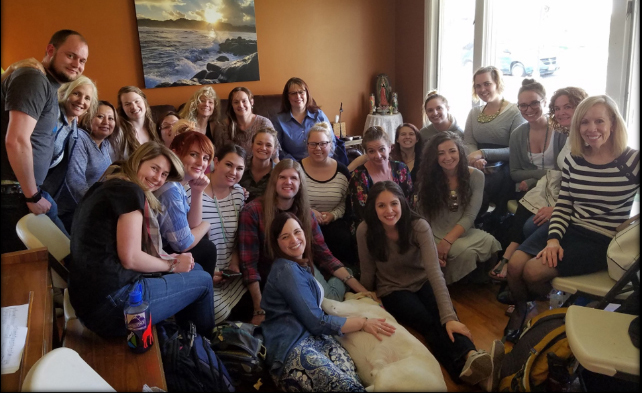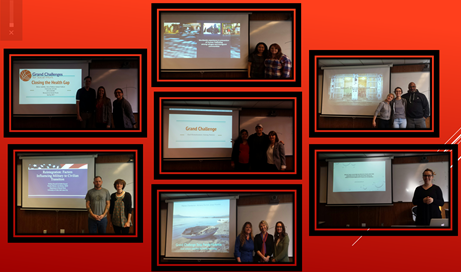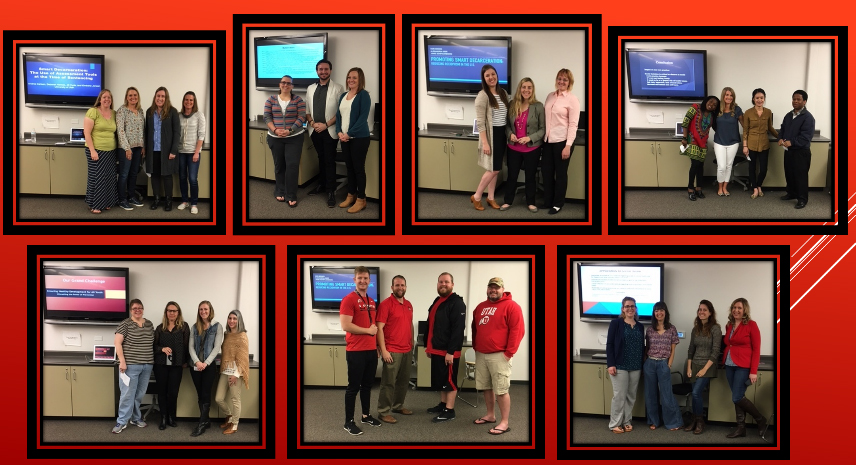MSW Research Class Explores Grand Challenges of Social Work

By Jaehee Yi, PhD, Assistant Professor, University of Utah College of Social Work, with Brandy King, MSW Student
Social work is a field known for covering a wide range of topics and allowing for numerous different job opportunities upon earning an MSW. According to the NASW Code of Ethics, “The primary mission of the social work profession is to enhance human well-being and help meet the basic human needs of all people.” The mission is a way to summarize the many different goals that social workers attempt to accomplish. When working on such a broad scale, it can be difficult to accomplish goals.
Every field—including social work— continually works toward addressing different, discipline-specific challenges. In an effort to clearly define those challenges in social work, the American Academy of Social Work and Social Welfare (AASWSW) created the Grand Challenges Executive Committee, which, in 2013, developed the Grand Challenges of Social Work. The Grand Challenges attempt to focus the profession’s mission into 12 tangible challenges; challenges that can be worked on and result in a measurable change within the next 10 years.
The next step should be to enable those working on the front lines of social work to take on the challenge of the Grand Challenges. MSW students at the University of Utah started this grassroots work earlier this year.
During the Spring 2017 semester, the MSW Research Committee at the University of Utah College of Social Work brought AASWSW’s Grand Challenges of Social Work to students in the Research in Social Work Practice course, which aims to help MSW students become critical consumers of research. Course instructors Caren Frost, Jen Molly, Liz Thomas, and Jaehee Yi framed the course in the context of the Grand Challenges by asking MSW students in their classes to work in groups to search, review, and criticize descriptive, correlational, and effectiveness research studies around the specific topics of their interest under the broad Grand Challenges.
Before starting the research projects, the classes talked about the purpose and importance of the Grand Challenges as a way to bring focus and unity to the field. The only way to make a real difference regarding a topic is having the research to support it. The Grand Challenges are a way to bring researchers together to concentrate on one topic and eventually make a difference because of collective research.
The classes also talked about wanting to harness current technology and find a way to connect social workers from around the nation in a way that simplifies collaboration on similar research. Student Elisa Pierce said, “I would have liked to work with another group in another state or have been able to know if other researchers were researching my same topic.” By creating a system that allows social workers to share their current research and network with other social workers would not only make more productive research, but also help to solve a problem that many social workers have after graduation: not having access to current research.
AASWSW identified 12 Grand Challenges as the broad goals of the profession:
Ensure healthy development for all youth Close the health gap Stop family violence Advance long and productive lives Eradicate social isolation End homelessness Create social responses to a changing environment Harness technology for social good Promote smart decarceration Reduce extreme economic inequality Build financial capability for all Achieve equal opportunity and justice
As with everything in life, interest sparks passion and passion creates product. Not every social worker is going to be interested in promoting smart decarceration, but some will have an extreme passion for it. When they have the passion, they will create incredible research. Similarly, different students in the research classes had different interests, leading the 20 different groups to select nine of the Grand Challenges for their projects.
It can be difficult to find research at times. Many of the students found that there was a good amount of research available, however, found that there were few longitudinal studies, which would present useful information that is not currently available. Many of the students also discovered that it was easier to find descriptive and correlative research, compared to effectiveness research. Descriptive and correlative research are invaluable, but effectiveness research is needed to create interventions.
“Most student groups found that the literature talks about the challenges a lot, but not about solutions,” said Dr. Yi. “I hope this finding itself was helpful for the students to realize that social workers, who work in implementing so many programs to improve these challenges, should contribute to conducting research on their programs and disseminate their findings.”
Dr. Yi went on: “I am very proud of my students who sincerely care about the populations and social challenges that they chose and worked hard to critically understand the literature. It is very important to recognize these efforts because these students are the future of the social work profession; the people who will take on the Grand Challenges.”
Below are brief descriptions of each group’s projects, including links to class presentations and papers (when available).
Challenge: Ensure Healthy Development for All Youth
Group 1: How Hispanic youth are able to obtain, follow through, and utilize mental health interventions.
Group 2: How service providers in K-12 settings use trauma-informed care to improve K-12 student outcomes in educational settings.
Group 3: How positive relationships for Latino youth impact high school graduation rates.
Group 4: How the health and well-being of Utah LGBTQ youth is related to of high suicide rates.
Group 5: How providing evidence-based prevention programs for children and youth at earlier ages, as well as continuing appropriately timed programs throughout adolescence, will affect youth who have been sexually abused. (Presentation slides available)
Challenge: Close the Health Care Gap
Group 1: How implementing universal health care in addition to considering factors such as race, location, and social determinates and how those results may reflect a lack of access to healthcare services.
Group 2: How trauma involving adverse childhood experiences (ACEs) can affect the physical and psychological damage of an adult’s long-term health. (Presentation slides available)
Challenge: Stop Family Violence
Group 1: How adolescents witnessing domestic violence between spouses is correlated with various potentially lifelong consequences. (Presentation slides available)
Challenge: Advance Long and Productive Lives
Group 1: How effective different strategies are for prevention of suicide attempts in the adult population.
Group 2: How volunteering or continuing to work after 65 years of age gives individuals a sense of productivity. (Presentation slides available)
Challenge: Eradicate Social Isolation
Group 1: How extracurricular activities decrease social isolation in school-aged children.
Group 2: How environmental factors influence social isolation in adolescents aged 12 to 24 years.
Challenge: End Homelessness
Group 1: How prevalent homelessness is in the elderly population and how implementation of housing programs would address medical and mental health needs in an integrated, collaborative structure.
Challenge: Create Social Responses to a Changing Environment
Group 1: How young adults become financially literate and how to improve financial literacy outcomes among young adults. (Presentation slides available)
Challenge: Promote Smart Decarceration
Group: 1: How the availability and effectiveness of educational/vocational training, substance abuse treatment, and sex offender treatment in adult prisons are promoting smart decarceration.
Group 2: How the different ways to reduce recidivism compare.
Group 3: How implementation of assessment tools could increase the likelihood of well-informed and evidence-based decisions in the criminal justice system.
Group 4: How the life is affected by the unfair treatment of those in mass incarceration. (Presentation slides available)
Challenge: Achieve Equal Opportunity and Justice
Group 1: How factors, including Transition Assistance Programs for veterans, are influencing military to civilian transition.
Group 2: How worldwide efforts to prevent human trafficking among refugee and immigrant communities are currently being researched.
The views and opinions expressed on the interACTION blog are those of the authors and do not necessarily reflect the official policy or position of the University of Utah or the College of Social Work.


